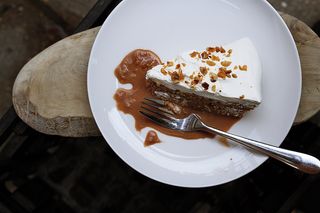Diet
Finding Peace in The Anti-Diet Age
A response to "Losing it in the Anti-Diet Age"
Posted August 5, 2017

On August 6th, The New York Times Magazine ran a cover story titled “Losing it in the Anti-Diet Age.” The author, Taffy Brodesser-Akner, documents her struggle to accept herself as a fat woman in a culture that doesn’t accept fatness. She searches for her path through diet-culture, which sells tempting promises to transform our body to fit our societal ideals yet fails time and time again to deliver on these lofty goals, and the anti-diet philosophy, an emerging movement premised on the idea that diets are doomed to fail and encourages us to focus on self-acceptance instead of weight loss. The conflict that the author faces in this story is captured in one of the opening paragraphs:
‘‘Dieting’’ was now considered tacky. It was anti-feminist. It was arcane. In the new millennium, all bodies should be accepted, and any inclination to change a body was proof of a lack of acceptance of it. ‘‘Weight loss’’ was a pursuit that had, somehow, landed on the wrong side of political correctness. People wanted nothing to do with it. Except that many of them did: They wanted to be thinner.
This is a struggle that so many can relate to. We know that diets don’t work. We have tried plan after plan, lost weight and gained weight, experienced the highs of starting a new regimen, the empowerment of stocking our pantry with the designated permissible foods, and the plummeting lows of falling off the wagon headfirst into a tray of double fudge chocolate brownies. We pick ourselves out of our chocolate covered despair and think: I’ll go back on a diet! That will help me get control over this vicious cycle. Why do we embark on this fruitless endeavor again and again? Because being fat in a fat-hating culture SUCKS.
To live as a fat woman in our society is to live under a constant threat of assault. It is to have your body be open for commentary from strangers and loved ones and medical professionals. It is to turn on the television or open the newspaper and read sensationalist stories about why your body is dangerous, a burden on society, and why it is your responsibility to fix it. It is to never see bodies that look like yours in the media except occasionally and in the most desexualized ways. It is to walk into a clothing store and be told they don’t have anything for you. It is to receive subpar medical care and then be blamed for your ailments. It is to be told on many levels day in and day out, that you are flawed, broken, and bad.
“They told me that hatred of fat was a societal construct, but I never understood why that should comfort me. I live in society.”
The idea that hatred of fat is a societal construct is not intended to comfort. Instead, it is intended as a perspective shift—a wake-up call—to rouse us out of sedated states of believing that our body is the problem and weight loss is the solution. When we believe the myth that our body is broken, we are disempowered to make any changes in our lives. We stay stuck in the diet-overeating-shame-self-hatred cycle, blame ourselves when our diet doesn’t work, and spend our precious time, energy, and money funding the $64 billion weight loss industry with companies like Weight Watchers profiting off our low self-worth. When we understand that the problem is our culture-- not our body-- it empowers us to focus our energy on things that we can change and care for ourselves as best as we can.
I want to note here that fat-hatred is something that affects people across the weight spectrum. In my work as a clinical psychologist specializing in the treatment of overeating disorders and body image dissatisfaction, I work with people large and small, curvy and straight, fat and thin. All are miserable about their body. Most are smart, successful women from diverse walks of life. Mothers and daughters, doctors and lawyers, artists and CEOs; the tyranny of diet-culture affects us all.
Acceptance does not mean that you don’t want to change. Quite the opposite, it is acceptance that creates the foundation for change. As I wrote in “Is Body Positivity Leading Us Astray?,” few of us love our body all the time and many feel alienated by the demand to be confident implied in body positivity. True acceptance involves accepting all aspects of your experience-- the times when you don’t feel good about your body, the times when you yearn for a new diet plan, the times when you feel hopeless. From acceptance comes compassion and from compassion comes change. This, I believe with all my heart, is the path to wellness—both physical and emotional.
Letting go of dieting is a leap of faith. We are like trapeze artists flying through the air. We have to let go of one bar to catch the next one. We may not always be confident that the next bar will appear when we need it to and we may not always trust that our body can carry us forward, but the more that we practice the more faith that we have in ourselves. Over time the movements become intuitive, we don't have to think about every step in agonizing detail, our body simply knows what to do. But that doesn't mean it's not scary as hell to be flying through the air.
Dr. Alexis Conason is a clinical psychologist specializing in the treatment of overeating disorders, body image dissatisfaction, and sexual issues. She is the founder of The Anti-Diet Plan, a mindfulness based program to help you stop dieting and start eating in attunement with your body. Sign up for her free The Anti-Diet Plan 30-day starter course today. Follow her on Twitter and like her on Facebook.


